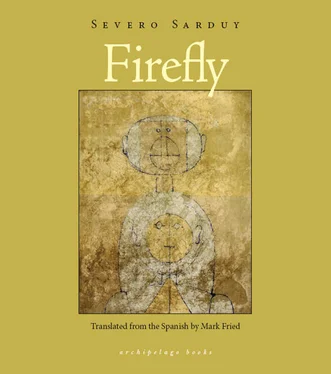Severo Sarduy - Firefly
Здесь есть возможность читать онлайн «Severo Sarduy - Firefly» весь текст электронной книги совершенно бесплатно (целиком полную версию без сокращений). В некоторых случаях можно слушать аудио, скачать через торрент в формате fb2 и присутствует краткое содержание. Год выпуска: 2013, ISBN: 2013, Издательство: Archipelago Books, Жанр: Современная проза, на английском языке. Описание произведения, (предисловие) а так же отзывы посетителей доступны на портале библиотеки ЛибКат.
- Название:Firefly
- Автор:
- Издательство:Archipelago Books
- Жанр:
- Год:2013
- ISBN:9781935744917
- Рейтинг книги:3 / 5. Голосов: 1
-
Избранное:Добавить в избранное
- Отзывы:
-
Ваша оценка:
- 60
- 1
- 2
- 3
- 4
- 5
Firefly: краткое содержание, описание и аннотация
Предлагаем к чтению аннотацию, описание, краткое содержание или предисловие (зависит от того, что написал сам автор книги «Firefly»). Если вы не нашли необходимую информацию о книге — напишите в комментариях, мы постараемся отыскать её.
Firefly — читать онлайн бесплатно полную книгу (весь текст) целиком
Ниже представлен текст книги, разбитый по страницам. Система сохранения места последней прочитанной страницы, позволяет с удобством читать онлайн бесплатно книгу «Firefly», без необходимости каждый раз заново искать на чём Вы остановились. Поставьте закладку, и сможете в любой момент перейти на страницу, на которой закончили чтение.
Интервал:
Закладка:
So the melon-head climbed laboriously up the stepladder. His sister seemed to hold him up with her gaze. He reached the lookout. Under the rain, the city was like a weaving with diagonal stripes and all the colors pulverized, glued onto a white cardboard backing.
Little did his supposed fluency serve him. It turns out that sometimes, faced with what has to be said, words seem to soften and hang, flaccid and dripping saliva like the tongues of the hanged. What Firefly saw through the oxeye, as they say, had no name. He opened and closed his mouth like a harpooned porgy, trying to convey the scene to the inquiring chorus. But nothing came out. I’ll try to say it myself, in the most neutral way I can to avoid any possible humiliation of that speechless boy .
The wind blew with such force it sliced off the eaves. Roofing tiles flew by, red stains, like pomegranate seeds in the gray of the rain; they smashed against the plinths and the ceramic façades. Hail beat against the big swathed window with a raucous metallic rat-a-tat, minuscule tin drums.
That much Firefly was able to recount — in his own way of course, and in a stuttering stammering fashion — to the gathering that longed fervently for cleverness and received his words with a thousand mocking sniggers. What he could not recount is what happened next: how one of the roofing sheets first opened up like the blade of a jackknife, and then slid down and took off, a leaf of zinc that flipped halfway in the air and shone like a silver dagger before diving straight down like a bolt of lightning. and slicing off the head of a black man running with a suitcase in his hand.
In the illusions of the circus (Firefly had gone to a matinee performance of the Santos y Artigas), the head cut off at a drum roll settled imperturbably back on the neck of the plump albino woman who undertook this remarkable exploit daily; that of the black man under the hailstorm fell smiling onto the suitcase that the decapitated body continued to hold.
Firefly tried to speak, but could not. His right hand rose and fell, again and again, like someone chopping down a tree. He had become mechanized, a windup toy, voiceless.
Then he felt something not only invade him icily through his feet, tying all his nerves in knots, but mix in with his very body, spilling out all over, like a shroud of sweat and cold.
He looked away from the blood-spattered circus, but it was too late: his legs trembled, his teeth chattered like castanets, he stared off into space like someone cross-eyed or hallucinating, hearing voices. The stepladder itself began to wobble, as if a benign earthquake were shaking the foundations of the house, rather than a hurricane its rooftop.
Seeing him like that, so stricken and mute, his face mottled with streaks spreading like angry little snakes, the family, as always when faced with a defenseless rara avis, redoubled its cruelty.
The aunts launched into a derogatory dance — because a little boy must not go soft — and the cackling cripples, like deboned Graces, parodied his vacillations and silence by mamboing in unison while emitting chortles, cachinnations, and stuttering shrieks.
The father kept repeating, “For the love of God, for the love of God!” yanking on the tip of a Havana with his teeth and draining compulsive cups of cognac.
The mother worked the empty spinning wheel and began to sway senselessly in a rocker piled with cushions, the haunt of parturient she-cats.
The sister took him by the arm to help him climb down the last steps. She whispered in his ear, affectionately, “How about some linden-flower tea? Or the Golden Book of Animals to take your mind off it?”
The butt of the adults’ ridicule gave no answer. He fled sobbing to the kitchen, hunched over, hiding his face.
Once in the kitchen, using the cloth for drying the porcelain, he wiped away two big tears.
The buffeting winds were barely audible in there, but the brass pots hanging from the wooden rafters tinkled.
He counted the members of the family.
He prepared cups of linden-flower tea. For all, except himself.
He sprinkled them generously with rat poison.
With the utmost care, he laid them on a tray.
“So no one will know I’m afraid.”
*“The sandpiper dies blind,” says Gustavo Guerrero. A fisherman from Laguna de la Restinga, on Margarita Island in Venezuela, once told him their eyelids get scorched from all that pecking in salt water.
TO BECOME SOMEBODY ELSE
Around a fountain, as if drawn by its cool waters, the feverish patients lie under archways on wobbly cots with no more accoutrements than a few mosquito nets of coarse tulle rolled up on spindles during the day and unfurled at night to reach the brick floor.
Beside the beds stand large copper pitchers for their ablutions, as well as bowls, enema hoses, white ceramic jars with green unguents, a sieve of vein-hungry leeches swimming over one another, and an archipelago of cotton swabs stained with pus, saliva, and blood. Farther off, an amphora of wine. A crystal vase with an iris.
Muscular nuns with ruddy cheeks and severe mannerisms make their rounds under the archways in a perpetual scurry and always in the same direction, collecting refuse and tendering salves and consolation, or little wool sacks with camphor stones, which they slide brusquely under the pillows.
Carefully, they close the eyes of the moribund and tie their jaws up with white cloths so that rigor mortis will not catch them by surprise; they give the thirsty salt to suck; they oblige those suffering boils or anemia to gulp a gelatinous and searing fish soup, which they shove at them with an enormous wooden spoon.
So heavily starched are the edges of their polyhedral cornets that the patients fear getting sliced open when the nuns go rushing by, busy as leaf-cutter ants throughout the night.
In the courtyard, next to the central fountain and spattered by its spray, stood a whipping post. Sick children frolicked around it and leaned contentedly against it, like someone playing on a swing unaware it was once a gallows.
The seven recent arrivals occupied an entire side of the square formed by the archways framing the courtyard. Firefly was in front. Wearing loose trousers, he lay on an unmade cot with a very heavy pillow across his feet.
The rest of the family floated in limbo, laughed in dreams, snored in chorus, praised or battled invisible interlocutors, caught a glimpse perhaps of the paradise to which all believers aspire and which often takes the form of a garden in full bloom. The chief and only physician of the provincial hospital called on two retired luminaries of the island’s medical community and begged them to join forces to decipher the enigma of this family, delivered from the recent disaster only to be plunged into a bottomless and immutable “post-cyclonic hypersomnia.”
Let’s watch the two healers from behind, strolling along a promenade bordered by royal palms up to the doorway, where the doctor greets them with only a simple embrace then points the way with a gesture of therapeutic impotence.
But, before we go on, who are these providential practitioners? To us, they appear as if in yellowed photographs or old faded postcards, surrounded by their appurtenances, their favorite gadgets, like peasants at a fair with the wooden cigarettes, desiccated cockatoos, sailors’ caps, or tin rings, all provided by the photographer and yet true to the subject’s identity.
First Gator, the herbalist, who collects the most paraphernalia.
Gator is wearing what looks like a dark blue suit with white pinstripes, round wire-rim glasses, and a silk tie decorated with tiny four-leaf clovers. His shoes are made of his own skin.
More worthy of mention is the place where he makes his appearance: in an orthopedic chair. Not that he is crippled, not at all; though he is lean and olive-skinned, long and bony, all obtuse angles and kinks, there is nothing unhealthy about him. His sallow disjointed face and that habit of sliding his index finger from his upper lip to his cheekbone are just his normal peculiarities. This phyto-practitioner, or herbalist to be more precise, has conserved (no one really knows why) all the therapeutic artifacts of bygone days when, rather than obey nature in its tortuous designs, he set his mind to using the most polished and austere of mechanical devices to oblige it to follow his own.
Читать дальшеИнтервал:
Закладка:
Похожие книги на «Firefly»
Представляем Вашему вниманию похожие книги на «Firefly» списком для выбора. Мы отобрали схожую по названию и смыслу литературу в надежде предоставить читателям больше вариантов отыскать новые, интересные, ещё непрочитанные произведения.
Обсуждение, отзывы о книге «Firefly» и просто собственные мнения читателей. Оставьте ваши комментарии, напишите, что Вы думаете о произведении, его смысле или главных героях. Укажите что конкретно понравилось, а что нет, и почему Вы так считаете.












